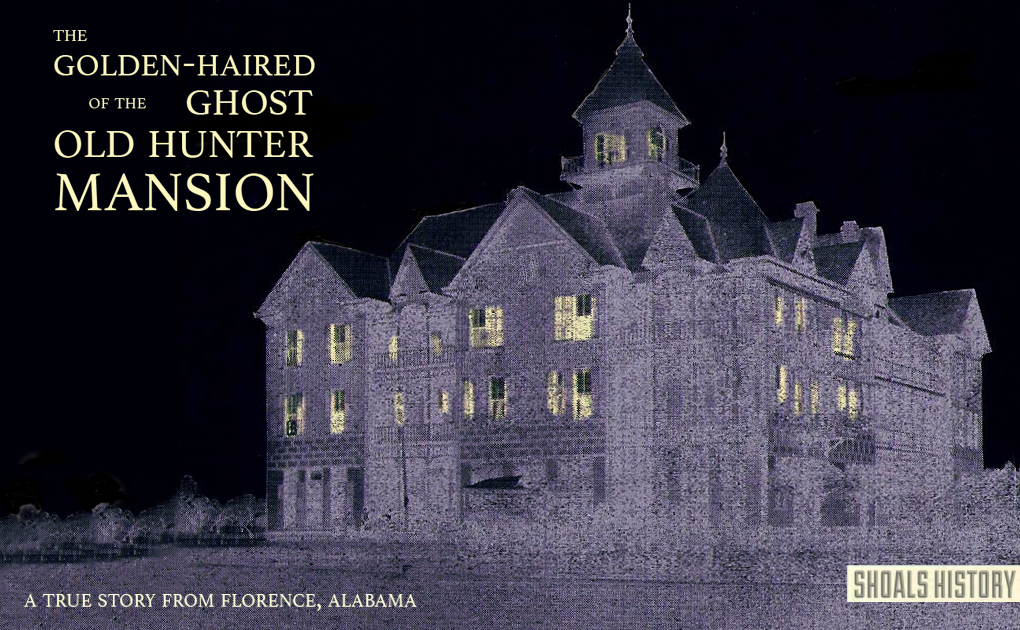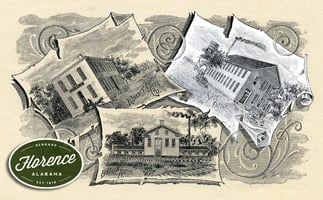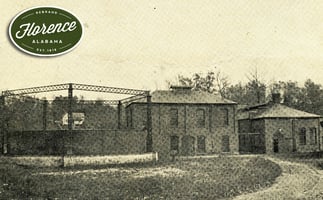REBRAND FLORENCE PARTNERSHIP Shoals History is excited to partner with the Rebrand Florence...
Golden-Haired Ghost of the Old Hunter Mansion
A True Story from Florence, Alabama

The spirit of Alice Hunter appears every year on the anniversary of the day when her lover was brought home to her dead.
Among the first settlers attracted to the town of Florence, Alabama by the picturesque beauty of its location above the swift flowing Tennessee was a North Carolinian, named Richard Hunter.
Wealth in those days was counted in the South by the acreage of plantations and Richard Hunter possessed enough for a barony. Richard Hunter had but one child, the sole heiress of his acres and his wealth, and she had just budded under the warm glances of a Southern sun, into womanhood, fresh and blooming as a wild rose. Tall and willowy, with all the lithe grace peculiar to the women of the South, she was, nevertheless, in hair, eyes and coloring, a type of one of her Scotch ancestresses, who, born amid the hills of the highlands, had been transplanted to a congenial home amid the mountains of Western North Carolina.
Alice Hunter was in that period of life where the present is so bright that its glow reaches out and dominates the future. Wealth, doting parents, gratification of every wish were hers, but, above all, she had won the love of the man of her choice and was happiest in the knowledge that Philip Marston’s dearest hope and highest aspiration centered in herself. “Phil” Marston, as he was known to everyone, was young, handsome, free-handed, free-hearted, gallant and all that went to make him an ideal lover. In spite of strong rivalry, he had won his lady love, and the day was set for their marriage. His broad and well-tilled lands adjoined the Hunter plantation, and Richard Hunter knew that it would make almost a principality joined to his own. Nevertheless, Alice was only 17, and so the wedding day was postponed until the following year.
Suddenly, in 1836, the Cherokee war broke out. Philip Marston raised a company of riflemen from among the handy yeomanry of the section and joined the command of his friend and neighbor, General Coffee. Throughout the sharp and decisive campaign that followed Marston bore a part of conspicuous for gallantry until the final battle on the banks of the Coosa. Hemmed in upon a peninsula, bounded, all but a narrow neck of land, by swollen waters of the river, the chiefs and bravest warriors of the Cherokees made their last and desperate stand. Leading his riflemen to a charge Philip Marston fell, mortally wounded.
Bad news travels quickly. It was on a night of furious wind and rain that a hunting-shirted rifleman brought the tidings of Philip Marston’s death to the Hunter mansion. The blast bowing the ancient oaks and the driving rain came down in slanting sheets. Suddenly the great bronze knocker on the door pealed out its summons, and Alice, thinking that none but a lover would brave the tempest and the darkness, flew to greet him. In silence and with bowed head the hardy pioneer pointed to the riderless steed which he led and extended to her a scrap of paper on which her dying lover had traced a few words of farewell.
Pale, calm, tearless, the ghost of herself, she watched the rude but loving mourners bear him to a chamber in the house and lay him, as if asleep, upon a couch. It was the sleep of death, from which kisses on the cold lips or warm caresses on the pallid brow could not awaken him. Day by day she faded like a lily that is denied moisture and within a few short weeks her spirit fled to join him in another world.
Since then the Hunter house has had many owners and many occupants, but every year, upon the anniversary of that stormy night in 1836, the stroke of a horse’s hoofs are heard without, the old knocker clangs, footsteps sound upon the stairs, and the occupants of the south chamber, the same in which Philip Marston’s body lay, receive a ghostly visitant. Such being the case, few care to occupy the apartment during the latter part of June. The last authenticated instance of anything being seen there was as follows:
Ten years ago the house was owned and occupied by a family named Thunsden, among the members of which was a nephew named William Black, a young and rising member of the bar. Early in the summer of 1882 the Thunsdens went on their annual pilgrimage to one of the Virginia watering places, leaving young Black to occupy and care for the house in their absence. He was the sole inmate, as, according to the Southern custom, the servants lived in a separate building, and, indeed, it would have been difficult to have coaxed any to spend a night there at any time. Several days had gone by without incident, until the night of June 25.
Black had started to go to bed, but was suddenly seized with an unaccountable loneliness and distrust of his solitary condition, and upon reflection recollected that this was the anniversary. He was a man of noted courage and physical strength and not a bit superstitious. Nevertheless, like most of us, the coincidence gave him a creepy feeling and he resolved on having company. Taking his hat and cane, he went in search of a fellow barrister of his own age and with whom he was intimate, one John T. Jones, who held forth upon the Courthouse Square and kept a bachelor’s hall over his office. Ascending the narrow staircase, he found his chum ensconced in bed, but not yet asleep.
In response to Black’s invitation to go and spend the night with him he good-naturedly consented, and they were both soon en route for the Hunter mansion. It was about 11:30pm and as beautifully calm and clear a moonlit night as heart could wish when they entered the house, and, after locking the hall door, when to Black’s room, the south chamber. Young men make short work of toilets, so they were quickly in bed, and, neither being sleepy, Black started to tell Jones the story of the haunted room. He had just finished when the old cracked bell in the Courthouse tower struck midnight, and as the last reverberations died away a horse’s hoof strokes could be distinctly heard upon the gravel walk without.
Suddenly and without warning the windows commenced to rattle in their casements and a noise resounded from the roof as if torrents of rain were descending upon its weather beaten shingles. All this time the moon was throwing its bellow rays into the room, lighting it up to a mezzo tint and the shadows cast from the trees showed that no breath of air was stirring. Then came the clang of the old knocker upon the hall door; the noises ceased as quickly as they had begun and all was silent.
Jones and Black were brave enough, and would have faced the devil and all his imps in broad daylight, but this was more than they had bargained for. The noise had been startling, but the silence that followed it was so intense that it was almost palpable. Then “tap” – “tap” – “tap” – “tap” – came the unmistakable sound of footsteps upon the stairs, slowly and wearily mounting. They ceased for a second or two upon the landing outside, the door swung noiselessly open, and a figure, clearly seen in the moonlight, entered and crossed the room.
Both men, lying on the bed, saw it plainly and afterward described it as that of a young and beautiful girl, tall and slender, with golden curls framed around a face of marble pallor, wide open blue eyes and clothed from head to foot in fleecy white, with a single white rosebud nestling above the ear. Advancing slowly to one of the windows, the figure stood a moment with clasped hands looking wistfully out into the night and with the full flow of the moonlight upon its upturned features; then it turned, approached the side of the bed where Jones lay, stooped and placed a hand, cold as death itself, upon his forehead.
Up to that moment he and Black had been too frightened to move or speak, but when that icy hand was laid upon him the spell was broken. Human nature could endure no longer, and with a yell both of them tumbled out of the other side of the bed from where the figure stood and bounded down the stairs. How they ever unlocked the hall door or got outside neither of them could ever tell, but when they came to themselves sufficiently to take in the situation they were making record time, clad only in their night clothes, towards Jones’ office. They did not go back to the Hunter house that night, in fact, it was some days before they could summon nerve enough to go, in daylight and get their clothing.
Since then the night of the 25th of June in each year finds that room untenanted. Singularly enough, the noises described are never heard elsewhere through the house but if anybody is earnest in a search for new sensation, he can easily obtain it by visit at the proper time and a night spend in the south chamber of the old Hunter mansion.
The above story was first published in the Philadelphia Times newspaper in 1892. Shoals History repeats it here as originally written.


